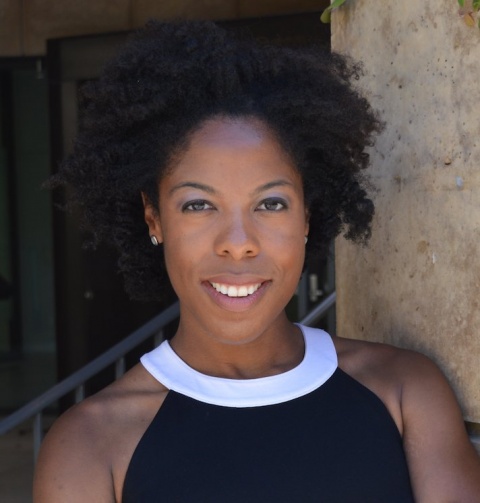Columbia College | Columbia University in the City of New York
Take Five with Amari Hammonds ’09

What were you like when you arrived at Columbia?
I did not have a curfew growing up because my mom knew I was the last kid who would ever get into trouble. My friends and I would hang out at each other’s houses, at the mall, or at one of many casual dining establishments in the St. Louis suburbs, and trust me, there was nary a joint or a bottle of alcohol in the vicinity. So when I arrived at Columbia, I was the girl who grew uncomfortable once my NSOP nighttime game of capture the flag ended in E.C. beers — I left the after-party within five minutes, but the beers looked awful so I’m sure I missed little. A few days later, I skipped the trip my Carman 6 floormates took downtown to get fake IDs, partly because I was a broke scholarship kid who rationally concluded the risk of confiscation made the going rate for such contraband exorbitant. But I also skipped because I thought I should wait to drink until I was 21 so that I wasn’t breaking any rules. Though now I’m recalling the time I slipped through a side door at Mona’s and danced to Sean Paul’s “Temperature.” So I guess I wasn’t a total goody two-shoes?
What do you remember about your first-year living situation?
My roommate was so much cooler than me! She was from L.A. and drank and smoked pot and often had friends over. And I felt so awkward and dorky, especially with her guy friends, since I did not know how to interact with boys. Thank goodness she was also kind and generous. I remember that more than any conflict there was between the two of us.
What Core class or experience do you most remember, and why?
Lit Hum with David Eisenbach ’94, GSAS’96. The man seemed to genuinely love the material and love teaching it. Sometimes he literally had a twinkle in his eye. I swear a somewhat Grinch-ean smile used to spread across his face when our freshman-intellectual insights and hot takes began to fly, like he was tickled by the intrigue and the suspense that built before the next revelatory comment. I can still hear him reciting, “In Xanadu did Kubla Khan / A stately pleasure-dome decree ....”
Did you have a favorite spot on campus, and what did you like about it?
I can’t say I had a “favorite” spot but I have very strong memories of a particular spot: where Hamilton Hall meets College Walk on the west side of the building, because that’s where Peter Johnson from Admissions (rest in peace) used to enjoy his smoke breaks. I met Peter before Columbia, when I was a contestant and he was a judge on ABC’s The Scholar. Coming to NYC meant losing the security of having some grown person who lives near you and cares about you. So reliably seeing Peter just off College Walk — with his smile, his rich laughter, his bowtie, his genuine curiosity about how I was doing — made me feel safe.
What, if anything, about your College experience would you do over?
I would have participated in more black student groups like the Black Students Organization (BSO). Having a forever-family and network in Stanford Law School’s Black Law Students Association has undoubtedly been significant for my sense of community, connection, and confidence in my experiences as a black woman moving through the world. And it’s made me realize how powerful that supportive environment would have been in college. Just as one example — from childhood through my mid-20s, not having a core group of black peers really impacted my self-esteem. I even developed an eating disorder a few months after arriving at Columbia, channeling my newfound independence and self-determination into an unhealthy cycle motivated in no small part by the conviction that if I could just make my curves go away (impossible, it turned out) and look more like all my non-black friends, then maybe I would no longer be invisible to the types of boys floating in our social circles. (Shout-out to the team of medical professionals at Health Services who helped me through that journey, whew.)
Don’t get me wrong, my friendships at Columbia were incredibly meaningful — several are still going very strong and are deeply loving and comforting and joyful. But I definitely missed out on other bonds that would’ve been life-giving in a different, unique way. There’s really no replacement for the ability to be vulnerable with people who will “just get it.” I don’t mean to suggest that joining BSO would have been some magic bullet, and I do not view black community in an instrumentalist way. Nonetheless, I do wonder how certain aspects of my life’s trajectory might have been different if I’d had that kind of community during those formative years.
More “Take Five”
- 1 of 32
- ›

